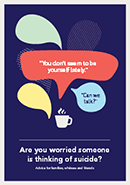Most people thinking about taking their own life will try to let someone know, but they often won’t say so directly.
Warning signs for suicide
If someone shows one or more of these signs, it doesn't necessarily mean they are suicidal, but they may need support. You might notice they:
- tell you they want to die or kill themselves
- access things they could use to hurt themselves
- read or write about suicide online, or post photos or videos about suicide
- become obsessed with death
- become isolated or withdrawn from family, whānau and friends
- don't seem to be coping with any problems they may be having
- have changes in mood – becoming depressed, angry or enraged
- hurt themselves
- feel worthless, guilty, or ashamed
- have no hope for the future
- use drugs or alcohol to cope with difficult feelings or thoughts
- lose or gain a lot of weight, or have unusual eating patterns
- sleep a lot more than usual, or stop getting enough sleep
- seem to have lost interest in life, or things they used to enjoy
- give away possessions, pay back debts or 'tie up loose ends'
- stop taking their medication
- suddenly seem calm or happy after they have been depressed or suicidal.
Some people who are suicidal might not show these signs, and some warning signs may not be obvious. People who feel suicidal might try to hide what they are going through or pretend they are okay.
If you think that someone might be at risk, pay attention to changes in their behavior, trust your instincts and ask them directly if they are thinking about suicide.
Go to If you’re worried someone may be suicidal for more information.
Who is most at risk of suicide?
People from all backgrounds can feel suicidal. Lots of people go through this. Someone may be at higher risk if they have:
- attempted suicide before
- been experiencing depression, bipolar disorder or another mental illness
- an addiction to alcohol, drugs or gambling
- a serious physical illness
- just started or stopped taking medication for a mental health problem
- lost a friend or family member to suicide
- been a victim of violence, bullying or sexual abuse
- a court case coming up or a recent prison sentence
- been judged, shamed or put under a lot of pressure
- no strong relationships with family, whānau, friends or community
- no sense of their own identity or purpose in life
- been through a major life change, like moving to a different country, or retiring from work
- had a major loss or disappointment, like someone close to them dying, failing exams or having their refugee status declined
- recently broken up with their partner or lost custody of their children
- been struggling to find work, lost their job recently, or had serious money problems
- friends, family or people around them who don't support who they are, like their sexuality, gender identity or other identity.
Find out more from the Ministry
Go to Suicide prevention to find out what the Ministry and health sector are doing to help prevent suicide in New Zealand.


